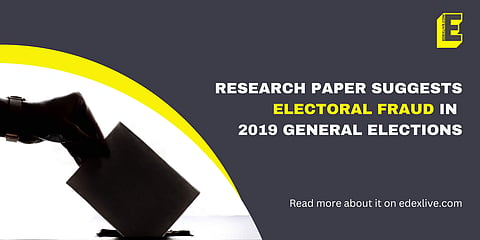

A research paper ‘Democratic Backsliding in the World’s Largest Democracy’ by one of the faculty members at Ashoka University has stirred furore among the netizens.
The research paper, written by Sabyasachi Das, Assistant Professor, Department of Economics at Ashoka University, suggests instances of electoral manipulation by the ruling party BJP in the 2019 General Elections in India.
Following the debate online, the institute also issued a statement saying that the research paper does not reflect the stand of the university.
“Ashoka values research that is critically peer-reviewed and published in reputed journals. To the best of our knowledge, the paper in question has not yet completed a critical review process and has not been published in an academic journal. Social media activity or public activism by Ashoka faculty, students or staff in their individual capacity does not reflect the stand of the University,” the university said in a tweet posted on Tuesday, August 1 at 6 pm.
The tweet added that the university is “dismayed” by the speculation and debate around the paper and the university's position on its contents.
What does the paper say?
The research paper “Democratic Backsliding in the World’s Largest Democracy” by Sabyasachi Das speculates on electoral fraud in the 2019 General Elections in India.
The paper contributes to the discussion by documenting irregular patterns in the 2019 General Election in India and identifying whether they are due to electoral manipulation or precise control. The term “precise control” means the incumbent party’s ability to precisely predict and win margins through campaigning.
In an abstract summary of the paper provided by Das, he says that the manipulation seems to take the form of targeted electoral discrimination against Muslims, partly facilitated by weak monitoring by election observers.
“The results present a worrying development for the future of democracy,” Das wrote.
While research papers don’t always grab headlines, Das’s paper gained attention online after MR Sharan, Assistant Professor in the Department of Agricultural and Resource Economics at the University of Maryland, took the research paper to Twitter.
Sharan explained the highlights of the paper in much more consumable language, striking a debate among the netizens.
“Das argues that his calculations suggest BJP gained about 11 additional seats by these types of manipulation (range: 9-18). These are back-of-the-envelope calculations. This is not enough to change government formation. BJP won very comfortably in 2019. However, this is a cause for serious concern for anyone invested in electoral democracy in India. No one piece of evidence cited above may be enough to cause concern, but taken together - this should make us sit up and worry,” MR Sharan tweeted.
Amid the heated discussion on social media, the Twitter thread by Prof MR Sharan has gained more than 1.5 million views and over 5,000 likes.
People react
The contents of the research paper have attracted a large number of responses — both good and bad.
While some renowned names like Paul Gertler, an American economist and MR Sharan, have lauded the research paper, others are not satisfied with the allegations that the paper puts forward.
In a tweet, Paul Gertler wrote that the paper was “by far one of the most convincing pol Econ papers that I have seen recently.”
On the other hand, a few users called out the paper for creating a ‘false narrative’. People have also criticised the university’s response calling it a cowardly statement by the institute.
Anant Sudarshan, Faculty at Department of Economics. University of Warwick, also weighed in on the topic.
“Let's reiterate that @sabya_economist has written a careful, rigorous, and brave paper. BUT suggestions of election fraud need to clear a high bar and cannot be uncritically retweeted,” tweeted Sudarshan.
